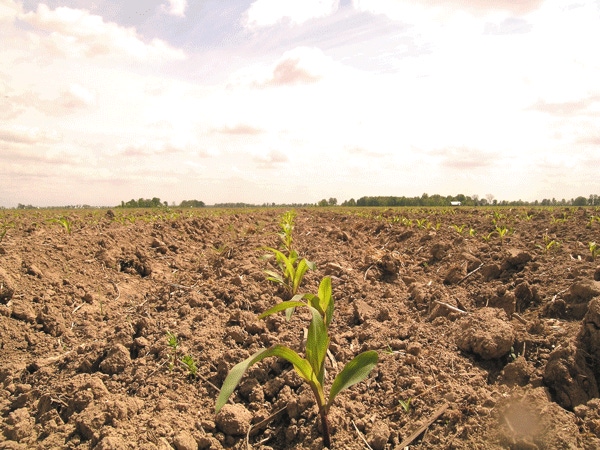
• Organic grain production, in particular, has shown a big increase in acreage in the past couple of years as organic livestock producers seek local sources of organic grain to feed their animals.• Ongoing success in breeding programs for organic grains continues to provide farmers with optimism for increasing organic grain operations in North Carolina in the coming years.• The North Carolina Department of Agriculture and Consumer Affairs’ Organic Cost-Share Program will pay growers up to $750, or 75 percent of certification costs.
February 8, 2011

Organic farming has had a steady increase in acreage in North Carolina in the past few years and two new cost sharing programs promise to be a boon to the state’s organic farmers.
Organic grain production, in particular, has shown a big increase in acreage in the past couple of years as organic livestock producers seek local sources of organic grain to feed their animals.
Ongoing success in breeding programs for organic grains continues to provide farmers with optimism for increasing organic grain operations in North Carolina in the coming years.
The North Carolina Department of Agriculture and Consumer Affairs’ Organic Cost-Share Program will pay growers up to $750, or 75 percent of certification costs. Applications for the funding, which run until Sept. 30, 2011 are being accepted and grants awarded on a first-come, first-serve basis.
Growers hoping to get into the certified organic program can find application forms at www.ncdaorganic.org or by contacting Heather Lifsey at 919-707-3127.
North Carolina organic producers and those transitioning to organic farming have until March 4, 2011 to sign up for the Environmental Quality Incentives Program (EQIP) Organic Initiative.
The USDA Natural Resources Conservation Service (NRCS) administers the initiative. Under the EQIP Organic Initiative. Approved applicants can receive up to $20,000 per year or $80,000 over six years.
Molly Hamilton, Extension assistant and project coordinator of the North Carolina State organics program, says, “A number of "core" organic conservation practices may be funded through the initiative including cover crops, conservation crop rotation, prescribed grazing, pest management and nutrient management.
All conservation practices offered under "general" EQIP are also available through the EQIP Organic Initiative including, but not limited, to fence and watering facilities for rotational grazing, erosion control practices, field borders, etc,” she says.
Applicants who are currently certified organic will need to include their organic system plan (OSP) reviewed by a USDA accredited organic certifier when applying for financial assistance in the EQIP Organic Initiative.
Applicants who are transitioning to organic will need to submit a self-certification form to the NRCS acknowledging they agree to develop and implement conservation practices for certified organic production that are consistent with an organic system plan.
The self-certification form may be obtained at time of application from any NRCS Service Center. Or, for more information on NRCS, programs and the EQIP Organic Initiative contact your local field office or visit www.nc.nrcs.usda.gov.
Variety development moving forward
Chirs Reberg-Horton, organic cropping specialist at North Carolina State University, says, “Our breeding for organic cropping systems (BOPS) project ended its first year. The project has endured a few setbacks, but continues to move forward to provide more variety options for organic corn, soybeans, wheat, and peanuts in the Southeast.”
Major Goodman, NCSU corn breeder, continues work on developing organic corn hybrids with a specific gametophytic gene that does not allow pollination by non-gametophytic corn types, thus organic corn varieties with the gametophytic gene would not cross pollinate with genetically modified corn, which is not allowed for organic production.
With these corn lines it will be possible to make crosses back to gametophytic corn lines developed at NCSU. Such genetically diverse crosses will ultimately lead to higher yielding hybrids with this out-crossing barrier, Horton says.
The outlook for organic soybean varieties looks just as promising. Tommy Carter, soybean breeder with the U.S. Department of Agriculture Agricultural Research Service, is currently searching over 20,000 soybean genotypes within the USDA soybean germplasm collection for characteristics that contribute to improved ability to compete with weeds.
Carter has successfully screened about 300 of these genotypes for qualities such as early increased leaf area, early increased height and width, and overall increased canopy vigor.
He also has made crosses between large leaved and long petioled soybean genotypes. These crosses may result in soybean genotypes that cover the ground quickly and minimize the light that reaches emerging weeds.
NCSU small grains breeders will ramp up efforts this coming wheat season to screen over 100 genotypes for wheat varieties that can tolerate or suppress Italian ryegrass infestations.
Though not as much in current demand, North Carolina peanut growers in the future may have an opportunity to grow organic peanuts.
Tom Isleib, NCSU peanut breeder, whose program has released a number of popular peanut varieties over the past 20 years, is conducting research to search the peanut core genetics collection to find genotype resistance to fusarium and other damping off diseases that significantly restrict organic peanut production.
About the Author(s)
You May Also Like





